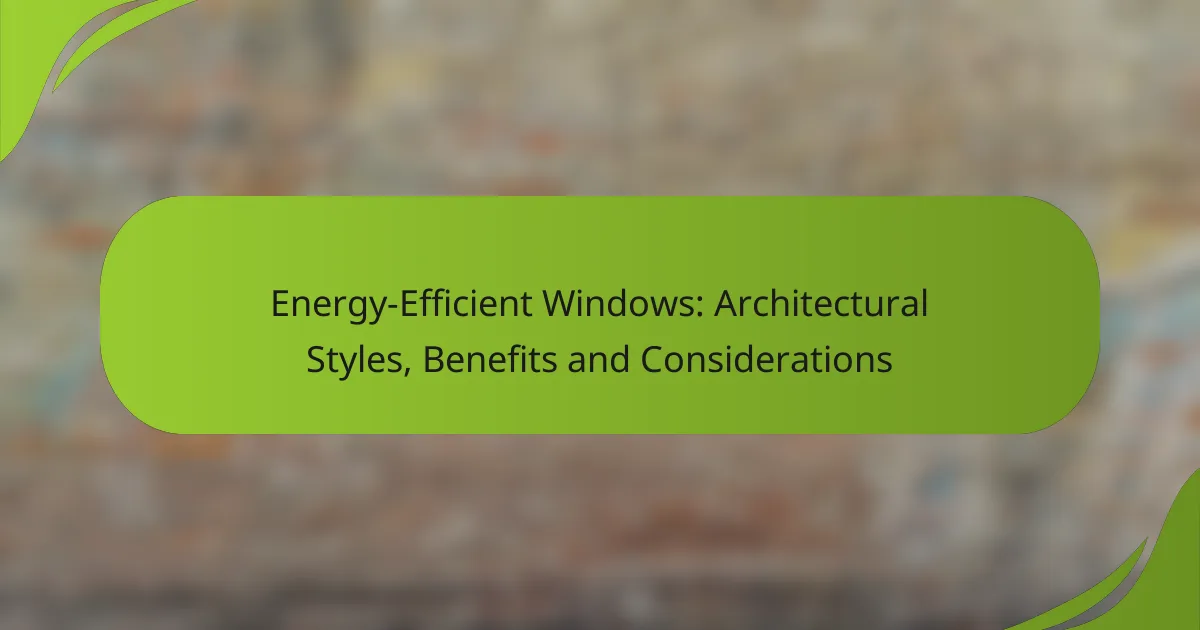Energy-efficient windows are a vital component in modern architecture, providing significant benefits such as reduced energy consumption and improved indoor comfort. They enhance various architectural styles while contributing to lower utility costs and increased property value. When selecting these windows, it’s essential to consider their ratings, frame materials, and installation quality to maximize performance and savings.
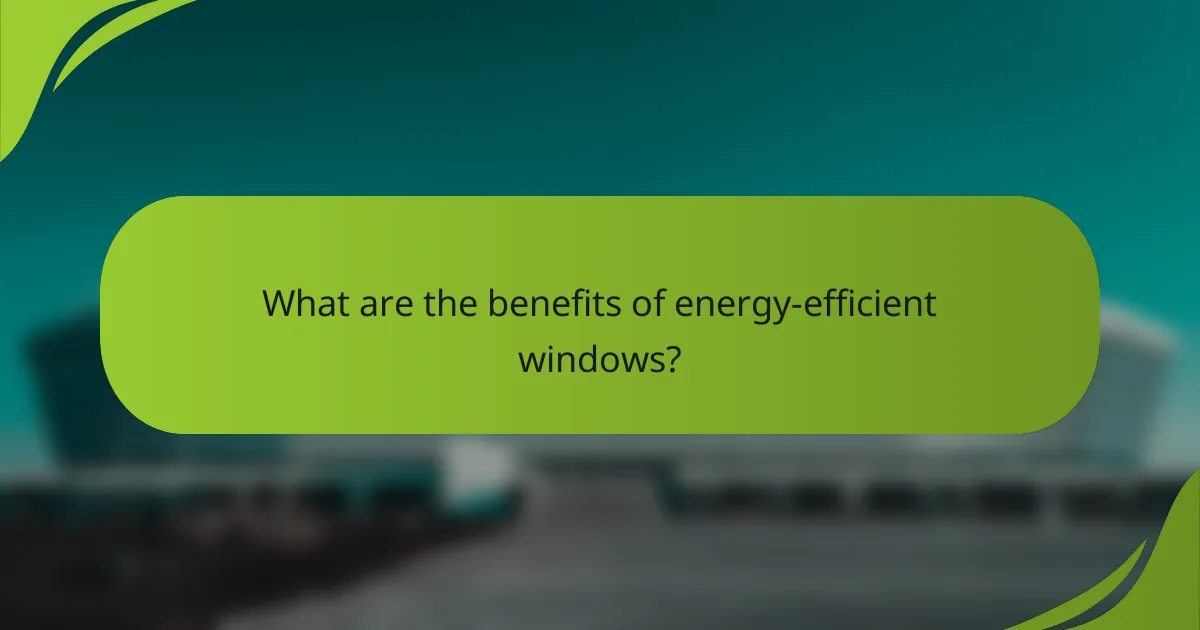
What are the benefits of energy-efficient windows?
Energy-efficient windows offer numerous advantages, including reduced energy consumption, enhanced comfort, and increased property value. By minimizing heat loss and gain, these windows help maintain a stable indoor temperature, leading to lower utility costs and a more pleasant living environment.
Lower energy bills
One of the primary benefits of energy-efficient windows is the significant reduction in energy bills. These windows are designed with advanced glazing technologies and insulation, which can lower heating and cooling costs by up to 30% compared to standard windows. Homeowners can expect to see a return on investment within a few years, depending on local energy prices.
To maximize savings, consider selecting windows with a high Energy Star rating, as they meet strict energy efficiency guidelines set by the U.S. Environmental Protection Agency. Additionally, look for windows with low U-factor and high Solar Heat Gain Coefficient (SHGC) ratings for optimal performance in your climate.
Improved comfort
Energy-efficient windows enhance indoor comfort by minimizing drafts and temperature fluctuations. They help maintain a consistent indoor climate, making spaces more enjoyable year-round. This is particularly beneficial in regions with extreme weather conditions, where maintaining a stable temperature can be challenging.
Moreover, these windows reduce condensation, which can lead to mold growth and other moisture-related issues. By keeping your home comfortable and healthy, energy-efficient windows contribute to overall well-being.
Increased property value
Investing in energy-efficient windows can increase your property’s market value. Potential buyers often prioritize energy efficiency, as it translates to lower utility costs and a more sustainable living environment. Homes equipped with these windows can sell for a premium compared to those with traditional windows.
In addition to resale value, energy-efficient windows can enhance curb appeal, making your home more attractive to prospective buyers. This investment not only benefits your wallet but also contributes to a greener future.
Environmental impact
Energy-efficient windows play a crucial role in reducing your carbon footprint. By lowering energy consumption, these windows help decrease greenhouse gas emissions associated with heating and cooling. This is particularly important in urban areas where energy demand is high.
Choosing energy-efficient options also supports sustainable building practices. Many manufacturers adhere to eco-friendly production methods, further minimizing the environmental impact of your home renovation.
Noise reduction
Another significant benefit of energy-efficient windows is their ability to reduce outside noise. These windows often feature multiple panes of glass and specialized framing, which effectively block sound transmission. This is especially advantageous for homes located in busy urban environments or near highways.
By investing in noise-reducing windows, homeowners can enjoy a quieter indoor space, enhancing overall comfort and quality of life. Consider options with soundproofing features if noise pollution is a concern in your area.
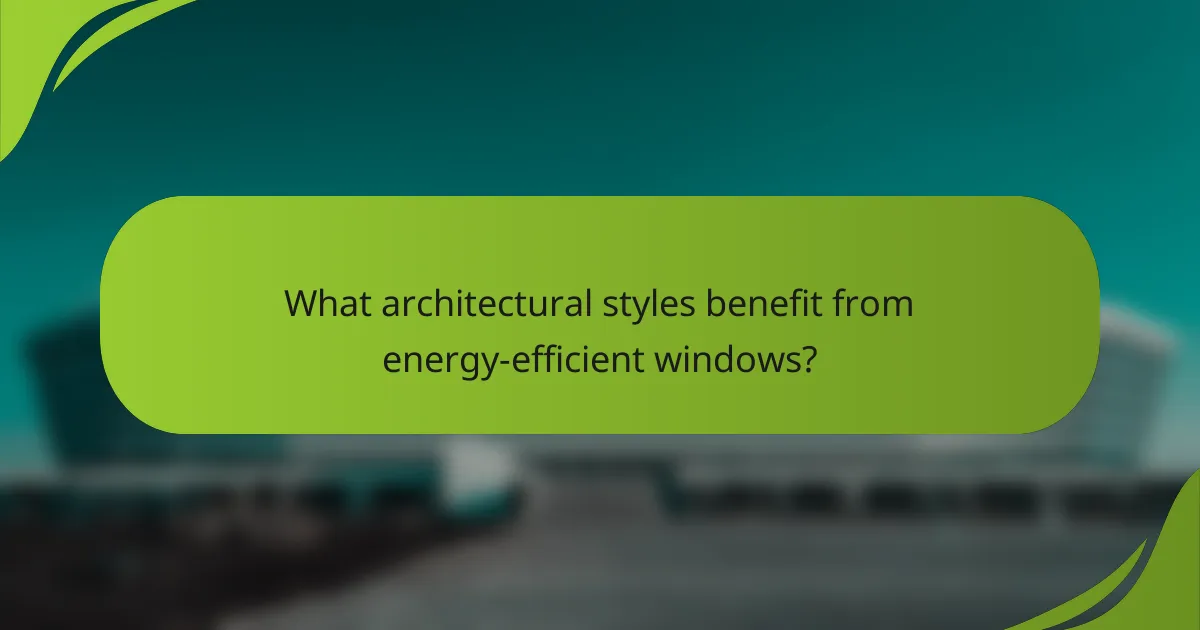
What architectural styles benefit from energy-efficient windows?
Energy-efficient windows can enhance various architectural styles by improving insulation, reducing energy costs, and increasing comfort. Modern, traditional, and commercial designs all benefit from these windows, which can be tailored to fit aesthetic and functional needs.
Modern architecture
Modern architecture often emphasizes large glass surfaces and open spaces, making energy-efficient windows essential for maintaining indoor climate control. These windows typically feature advanced glazing technologies, such as low-emissivity coatings and argon gas fills, which help reduce heat transfer.
When selecting windows for modern designs, consider options that offer high solar heat gain coefficients (SHGC) to maximize natural light while minimizing heat loss. Look for products that meet or exceed ENERGY STAR® standards for optimal performance.
Traditional homes
Traditional homes can also benefit significantly from energy-efficient windows, which can be designed to match historical aesthetics while providing modern insulation. Options like double-hung or casement windows can be fitted with energy-efficient glass without compromising the home’s character.
Homeowners should focus on window frames made from materials like vinyl or fiberglass, which offer durability and energy savings. It’s important to check local regulations regarding window replacements in historical districts to ensure compliance with preservation standards.
Commercial buildings
Energy-efficient windows are crucial for commercial buildings, where energy costs can be substantial. These windows help regulate temperature and reduce reliance on heating and cooling systems, leading to significant savings over time.
In commercial settings, consider using window films or smart glass technologies that adjust to changing light conditions. Additionally, ensure that windows comply with local building codes and energy efficiency standards, which can vary by region.
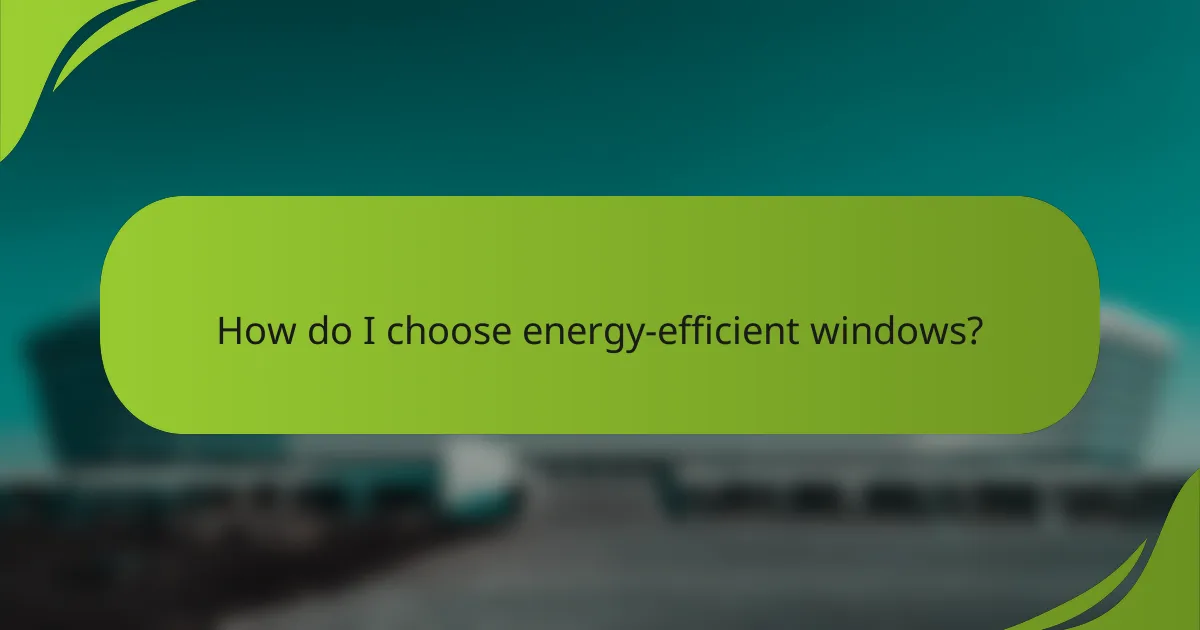
How do I choose energy-efficient windows?
To choose energy-efficient windows, focus on their ratings, frame materials, and installation quality. These factors significantly impact the windows’ performance and overall energy savings for your home.
Consider window ratings
Window ratings provide essential information about their energy efficiency, typically indicated by the U-factor, Solar Heat Gain Coefficient (SHGC), and Visible Transmittance (VT). Look for windows with a low U-factor, as this indicates better insulation and reduced heat loss.
Energy Star certification is another reliable indicator, ensuring that the windows meet specific energy efficiency guidelines. In the U.S., Energy Star windows can save homeowners an average of 7-15% on energy bills compared to non-certified options.
Evaluate frame materials
The frame material of windows affects their durability, insulation, and maintenance needs. Common materials include vinyl, wood, aluminum, and fiberglass, each with distinct advantages and disadvantages.
Vinyl frames are popular for their low maintenance and good insulation properties, while wood frames offer excellent aesthetics and natural insulation but require more upkeep. Aluminum frames are durable but may conduct heat, making them less energy-efficient unless they have thermal breaks.
Assess installation quality
Proper installation is crucial for maximizing the energy efficiency of windows. Poor installation can lead to air leaks, moisture issues, and reduced performance, negating the benefits of energy-efficient windows.
Hire experienced professionals who follow industry best practices and local building codes. Ensure they use appropriate sealing and flashing techniques to prevent drafts and water intrusion, which can significantly impact energy savings over time.
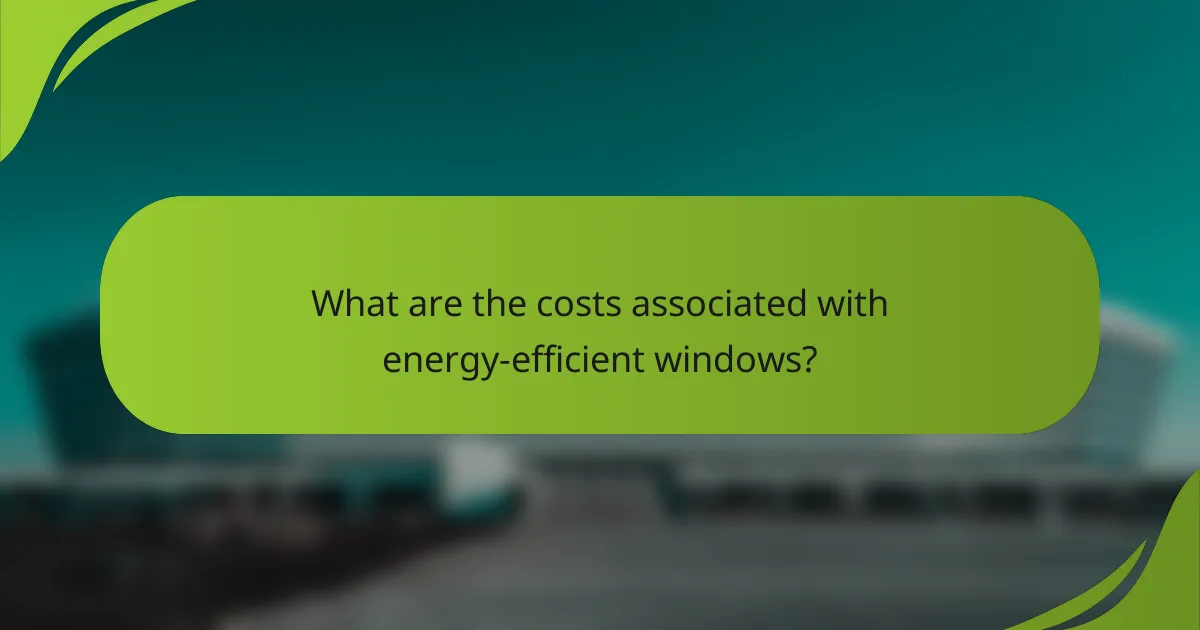
What are the costs associated with energy-efficient windows?
The costs of energy-efficient windows can vary significantly based on factors such as materials, installation, and local market conditions. Homeowners should consider both the upfront investment and potential long-term savings when evaluating these windows.
Average price range
The average price for energy-efficient windows typically ranges from $300 to $1,000 per window, including installation. Factors influencing the cost include the type of window (e.g., double or triple glazing), frame materials (vinyl, wood, aluminum), and size.
Higher-end options, such as custom designs or specialized coatings, can push prices beyond $1,000. It’s essential to get multiple quotes from contractors to find the best deal for your specific needs.
Long-term savings
Investing in energy-efficient windows can lead to significant long-term savings on energy bills, often reducing heating and cooling costs by 10-25%. These windows help maintain indoor temperatures, reducing the need for HVAC systems to work as hard.
Additionally, many regions offer tax credits or rebates for energy-efficient upgrades, which can further offset initial costs. Over time, the savings on energy bills can make these windows a financially sound investment.
Financing options
Homeowners looking to invest in energy-efficient windows have several financing options available. Many contractors offer financing plans that allow for monthly payments, making the initial expense more manageable.
Additionally, government programs and local utility companies may provide low-interest loans or incentives for energy-efficient home improvements. Researching these options can help you find a plan that fits your budget and financial goals.
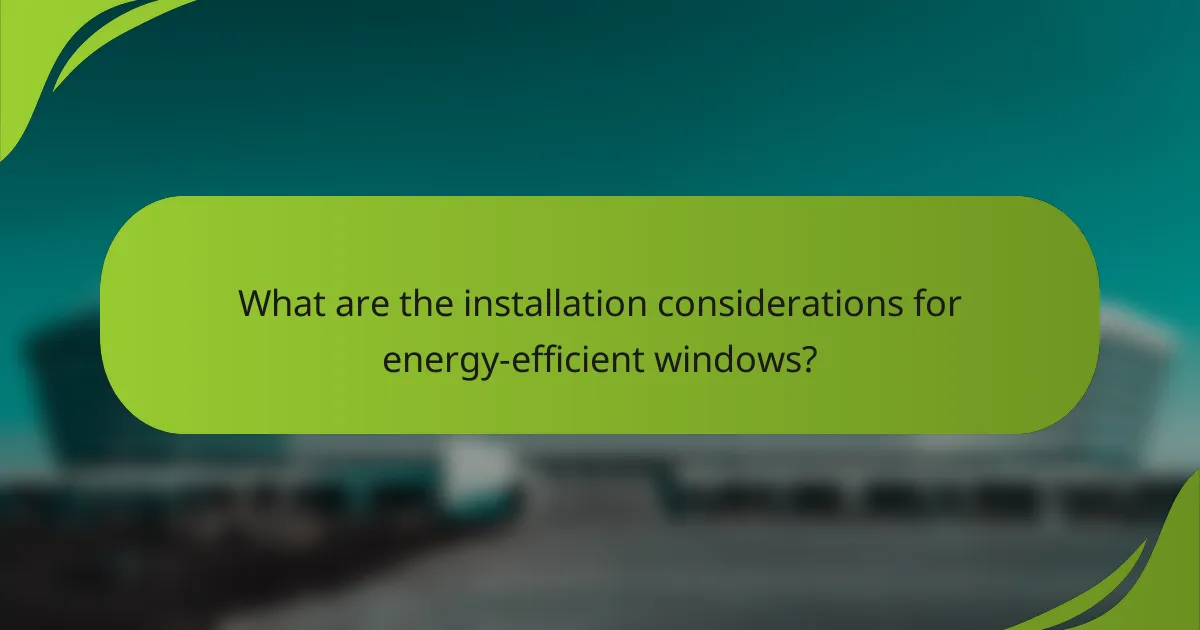
What are the installation considerations for energy-efficient windows?
When installing energy-efficient windows, key considerations include proper sizing, sealing, and alignment to maximize their thermal performance. Ensuring that windows fit correctly within the frame is crucial to prevent air leaks and enhance energy savings.
Professional installation benefits
Hiring professionals for energy-efficient window installation offers several advantages, including expertise in selecting the right windows and ensuring proper installation techniques. Professionals are familiar with local building codes and regulations, which can help avoid costly mistakes.
Additionally, professional installers typically provide warranties on their work, giving homeowners peace of mind. They can also identify potential issues with the existing structure that may affect window performance, such as rot or water damage.
In many cases, professional installation can lead to better energy savings compared to DIY efforts, as experienced installers know how to optimize window placement and sealing for maximum efficiency.
